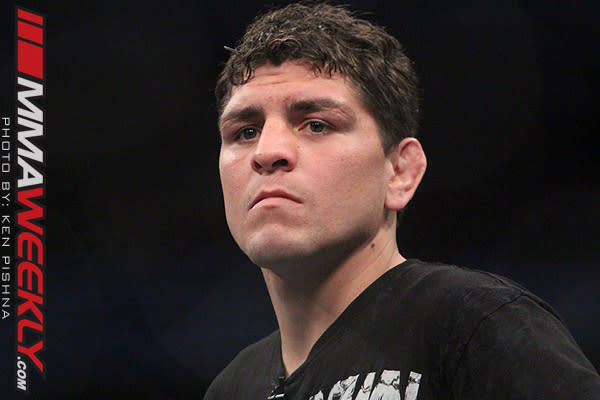Nick Diaz's Lawyer Files New Claim Firing Back at Allegations that He Lied to NSAC

Nick Diaz is still awaiting his day in front of the Nevada State Athletic Commission to answer to the charges of a positive test for marijuana stemming from his fight at UFC 143 in early February, but his lawyer, Ross Goodman, is firing back at the commission after recent statements made towards his client.
In a statement made to Yahoo! Sports in March, Jennifer Lopez, public information officer for the Nevada attorney general said, “Not only did Nick Diaz violate the law by testing positive for marijuana metabolites, but he also lied to the Commission on his Pre-Fight Questionnaire when he swore that he had not used any prescribed medications in two weeks before the fight.”
Now Goodman has fired back with a new document filed to the Attorney General's office dated from April 11, with a response in regards to Diaz's alleged falsification of the pre-fight questionnaire.
Goodman states that the “complaint does not allege any facts support that Diaz violated a rule.”
The document goes on to state that the “after the fact allegations impugning Diaz's character serve to distract from the core issue that Nevada does not prohibit inactive marijuana metabolites.”
The statement once again points out, as in the original complaint, that marijuana metabolites are not a prohibited substance under the rules adapted by the Nevada State Athletic Commission from WADA (World Anti-Doping Agency).
The second part of the document filed on Wednesday answers the charge from the Attorney General's office that Diaz lied on his original fight application filled out prior to his bout with Carlos Condit in February.
The document states “Diaz met the required standard, reasonable interpretation of commonly understood phrases to the best of his knowledge.” This is in reference to Diaz not disclosing any usage of medicinal marijuana on his pre-fight medical questionnaire.
As it has been well documented in the past, Diaz is legally allowed to use medicinal marijuana in his home state of California, but in all of the court documents filed thus far by Goodman, it states he cuts off his usage of the drug eight days prior to competition. The marijuana metabolites that he tested positive for are allegedly leftover in fat cells, that can show up on tests months after usage and should have no bearing on Diaz in his fight or drug testing results from the commission.
As far as his pre-fight questionnaire, Goodman argues that when Diaz did not list medicinal marijuana, he was not providing “false or misleading information,” but it was the questionnaire itself that has to be brought under fire for wording that did not define exactly what they were looking for.
“In the absence of prescribed definitions, Diaz relied on the general understanding of the terms ‘prescribed medications,' ‘over the counter medications,' and ‘serious medical illness.'”
The statement made says “there is no evidence to suggest that Diaz knowingly provided false information.”
Goodman points to the fact that medicinal marijuana is not a prescription drug or an over the counter drug, nor did Diaz believe his ADHD (attention deficit hyper activity disorder) was classified as a “serious illness.” (Diaz's approved medicinal marijuana usage was because he was diagnosed with ADHD).
Diaz's medicinal marijuana usage, while approved by a doctor, is only “recommended” as treatment by a physician, not actually a prescription drug that he would pick up at a pharmacy. Same as the argument for the over the counter drugs, as the statement says Diaz would assume it meant something that was picked up at a store like Walgreens or CVS.
Whether these arguments will actually lead to any kind of dismissal of the charges or allegations against Diaz remains to be seen, but Goodman closes his statement by saying, “unless Diaz's interpretations of ‘serious medical illness,' ‘prescribed medication,' and ‘over the counter medication or product' are so clearly wrong as to constitute sufficient proof of bad faith intent to deceive, the Commission must dismiss the allegations.”
Now it just appears to be a matter of time before Diaz gets his hearing in front of the Nevada Athletic Commission to ultimately decide on his punishment. Diaz was previously suspended in Nevada for a positive drug test for marijuana and was sentenced to a six-month suspension.
Typically in past cases like this, a second offense has landed an athlete with a one-year suspension from the Nevada Commission. It remains to be seen if that will be the same doled out for Diaz, or if his lawyer's arguments will somehow save him from that or some other fate.
Follow @DamonMartin on Twitter or e-mail Damon Martin.
For more UFC News and UFC Rumors, follow MMAWeekly.com on Twitter and Facebook.

 Yahoo Sports
Yahoo Sports 